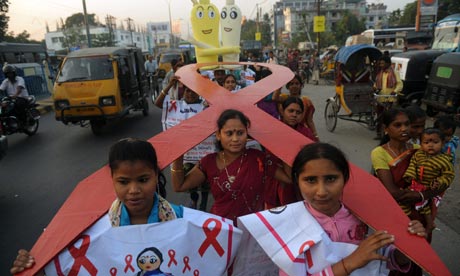
Thirty years ago, the first cases of what would later become known as Aids were identified in the US. Since then, HIV and Aids have spread across the globe, as has the battle to raise awareness, fight stigma and find treatments.
But, despite a worldwide drop in Aids-related deaths and improved access to antiretroviral drugs, a funding shortfall threatens to undo years of work.
In 2010 international funding for HIV and Aids dropped for the first time in 10 years.
More recently, the Global Fund to Fight Aids, Tuberculosis and Malaria said it would be unable to hand out new grants for programmes fighting the disease because of a lack of money. It only received $11.7bn at a replenishment meeting in New York last year. It had hoped for $20bn.
With that in mind, will we really be Aids free in a generation, as the US secretary of state, Hillary Clinton, said last week?
Between 2pm and 3pm GMT on Thursday 1 December, World Aids Day, a panel of experts on HIV and Aids will be live online to debate the issues.
On the panel will be Dr Christoph Benn, director, external relations and partnerships cluster at the Global Fund for Aids, Tuberculosis and Malaria, who worked for several years as a doctor in charge of a hospital in Tanzania and as co-ordinator of one of the country's early Aids-control programmes. He also co-founded the advocacy network Action Against Aids in Germany.
Richard Hayes, professor of epidemiology and international health at the London School of Hygiene and Tropical Medicine, whose main research interest is in the epidemiology of infectious diseases of public health importance in developing countries, with a particular interest in HIV and related infections.
Sonal Mehta, director of policy at HIV/Aids Alliance in India, who is running the largest programme backed by the Global Fund for HIV prevention, treatment and care for men who have sex with men, hijras and transgender people.
And Basil Williams, executive director, Caribbean HIV & AIDS Alliance, who works on HIV responses with sex workers and men who have sex with men, two high-risk groups. He has also led the Caribbean HIV and Aids Alliance in work with the tourist industry to highlight safe sex messages for tourists and to provide condoms.
Post your questions now and come back to see how the panel answer them at 2pm on Thursday. If you have any problems posting, or if you would prefer to comment anonymously, email us at development@theguardian.com and we'll add your question.

